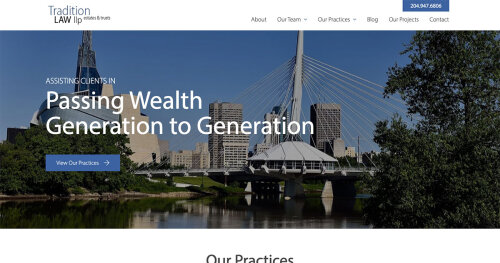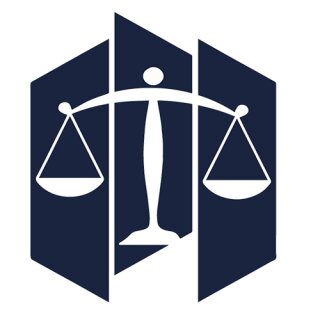Best Elder Abuse Law Lawyers in Canada
Share your needs with us, get contacted by law firms.
Free. Takes 2 min.
Or refine your search by selecting a city:
List of the best lawyers in Canada
About Elder Abuse Law in Canada
Elder Abuse Law in Canada encompasses legal frameworks designed to protect seniors from abuse, neglect, and exploitation. Elder abuse can take various forms, including physical, emotional, financial, or sexual harm. The Canadian government and provinces have put in place a series of legal measures to safeguard the rights and well-being of older adults, ensuring that they are treated with dignity and respect. These measures involve criminal law, family law, and adult protection laws tailored to address and penalize abuse efficiently.
Why You May Need a Lawyer
Elder abuse cases can be complex and emotionally taxing, often requiring specialized legal guidance. Common scenarios where legal assistance may be necessary include:
- Suspected financial exploitation, like unauthorized use of an elder's funds or property
- Physical or emotional abuse allegations
- Cases involving neglect in a healthcare facility
- Guardian or power of attorney disputes
- Concerns about legal rights in care facilities
Engaging a lawyer can help navigate these situations by providing guidance on legal rights, drafting necessary documents, and representing interests in court or negotiations.
Local Laws Overview
Elder Abuse Law in Canada is shaped by federal, provincial, and territorial legislation. Key aspects include:
- Criminal Code of Canada: Applicable across Canada, it addresses offenses like assault, harassment, and theft, providing a foundation to prosecute elder abuse.
- Provincial/Territorial Adult Protection Laws: Provinces and territories have specific legislation to protect vulnerable adults. For instance, Ontario's Substitute Decisions Act and British Columbia's Adult Guardianship Act focus on safeguarding those who cannot care for themselves.
- Human Rights Codes: Provincial and federal codes ensure protection against discrimination and protect the dignity of seniors.
Frequently Asked Questions
What constitutes elder abuse in Canada?
Elder abuse is any action or inaction causing harm or distress to an older adult, including physical, emotional, financial abuse, or neglect.
What should I do if I suspect elder abuse?
If you suspect elder abuse, report it to local authorities or a designated protection agency. Additionally, consulting a lawyer can guide you on specific measures to take.
Are there specific laws in Canada for elder abuse?
While there isn’t a standalone federal law, elder abuse is addressed through the Criminal Code and various provincial/territorial laws dedicated to protecting vulnerable adults.
How can a lawyer help in an elder abuse situation?
A lawyer can provide legal advice, represent the victim in court, assist in recovering misappropriated assets, and help navigate the complexities of guardianship or conservatorship issues.
Can I press charges against someone for elder abuse?
Yes, the victim or their representative can file a complaint with law enforcement, leading to a criminal investigation and possible charges against the abuser.
What are the penalties for elder abuse in Canada?
Penalties vary, ranging from fines and probation to imprisonment, based on the severity of the abuse and the specific charges under the Criminal Code.
How do provincial laws differ in addressing elder abuse?
Each province/territory has unique laws and resources emphasizing adult protection, guardianship issues, and health care rights, reflecting regional legal frameworks.
Can financial exploitation be considered elder abuse?
Yes, unauthorized or improper use of an elder's funds or assets is considered financial abuse, a recognized form of elder abuse.
Who can report elder abuse in Canada?
Anyone who suspects elder abuse, including family, friends, healthcare professionals, or concerned individuals, can report it. Some professionals may have a legal obligation to report.
What support services are available for victims of elder abuse?
Various services, including crisis intervention, counseling, legal aid, and support from government agencies or non-profits, are available to support victims of elder abuse.
Additional Resources
The following resources may aid those seeking more information or help:
- Government of Canada's Elder Abuse Awareness Program: Provides materials and support for preventing elder abuse.
- Seniors Safety Line: Offers a 24/7 hotline for elder abuse in Ontario.
- Canadian Network for the Prevention of Elder Abuse (CNPEA): A network focusing on elder abuse prevention and support.
- Provincial Ombudsmen Offices: Can assist in dealing with cases of abuse in care facilities.
Next Steps
If you or someone you know needs legal assistance related to elder abuse, consider the following steps:
- Consult a lawyer specializing in elder law or family law to discuss your case.
- Contact local authorities or adult protection services if immediate protection is necessary.
- Gather relevant documents and evidence to support your case.
- Consider reaching out to community services or advocacy groups for additional support.
- Build a support network of trusted family, friends, or professionals to assist you throughout the process.
Taking these steps can help protect the victim's rights and work towards a resolution.
Lawzana helps you find the best lawyers and law firms in Canada through a curated and pre-screened list of qualified legal professionals. Our platform offers rankings and detailed profiles of attorneys and law firms, allowing you to compare based on practice areas, including Elder Abuse Law, experience, and client feedback.
Each profile includes a description of the firm's areas of practice, client reviews, team members and partners, year of establishment, spoken languages, office locations, contact information, social media presence, and any published articles or resources. Most firms on our platform speak English and are experienced in both local and international legal matters.
Get a quote from top-rated law firms in Canada — quickly, securely, and without unnecessary hassle.
Disclaimer:
The information provided on this page is for general informational purposes only and does not constitute legal advice. While we strive to ensure the accuracy and relevance of the content, legal information may change over time, and interpretations of the law can vary. You should always consult with a qualified legal professional for advice specific to your situation.
We disclaim all liability for actions taken or not taken based on the content of this page. If you believe any information is incorrect or outdated, please contact us, and we will review and update it where appropriate.
Browse elder abuse law law firms by city in Canada
Refine your search by selecting a city.















